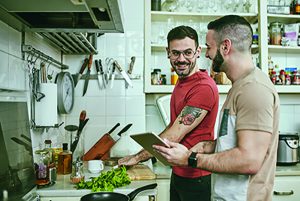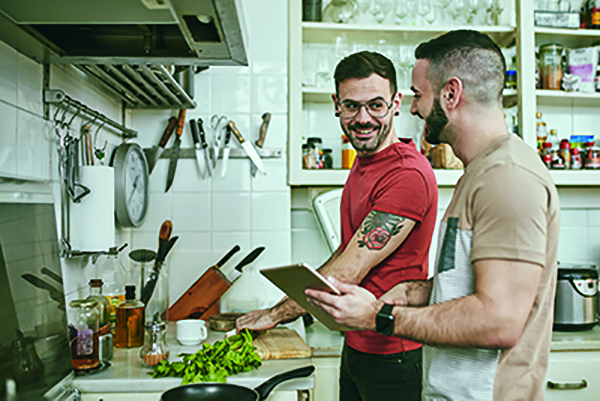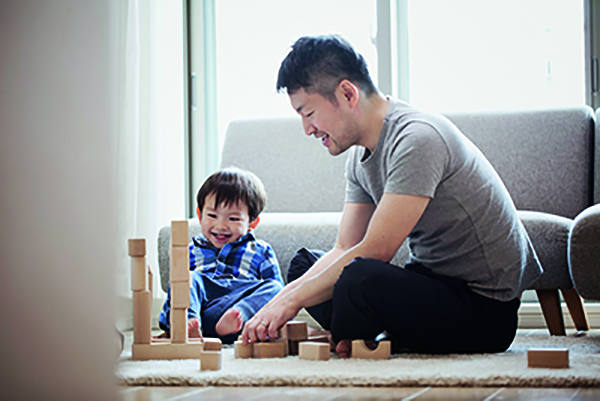Rethink your drink
Reshape your habits for better health
 How we choose to eat, drink and unwind plays a major role in our health over time. Entering the new year, we asked several PacMed providers to offer insight into what’s trending—and what should be.
How we choose to eat, drink and unwind plays a major role in our health over time. Entering the new year, we asked several PacMed providers to offer insight into what’s trending—and what should be.
GET MOVING
“An hour of activity outside of work per day complements the other factors of good health: diet, sleep and stress management. It doesn’t need to be strenuous—walking is an excellent option. Find an activity buddy. Studies show even an online accountability partner helps the behavior stick.”
—Charles Falzon, MD, MBA, Family Medicine doctor at Northgate
WE RECOMMEND
- No-frills activity tracking: www.myfitnesspal.com
- Try a Living Well Alliance class or video: www.PacMed.org/LWA-Events
A MEDITERRANEAN BOOST
“A ‘Mediterranean’ diet of mostly fruits, vegetables, whole grains, beans, nuts, seeds and olive oil lessens the risk for stroke. It also may link to longevity, weight loss and a lower risk for cardiovascular and fatty liver diseases. The diet allows for low-to-moderate consumption of wine, fish, poultry and dairy (but very little red meat).”
—Rex G. Cheng, MD, Gastroenterology and Hepatology specialist at Canyon Park and First Hill
TRY “DRY JANUARY”
“Many people start the new year by abstaining from alcohol for a month. Why is this a good thing? People can develop a tolerance with regular drinking. Taking a break helps reset and gives your liver a chance to repair itself.”
—Dimple Sahay, MD, Family Medicine doctor at Renton
WHOLE30: TRY IT (NOT A DIET)
“If you decide to get on the Whole30 bandwagon, remember it’s a 30-day elimination diet—not a long-term strategy for health or losing weight. There may be success stories, but there’s no scientific evidence backing Whole30 yet. Even if you find some foods to eliminate, you’ll need to follow a proven healthy eating plan—like the Mediterranean diet—for lasting health.”
—Christy Goff, MS, RDN, CD, — dietitian serving PacMed clinics, plus local employers through the Living Well Alliance™
WE RECOMMEND
- Cook for yourself: www.PacMed.org/Recipes
- Sign up for home veggie delivery: www.imperfectfoods.com
BE A QUITTER
“Smokers who are ready to quit can be helped by individual or group therapy, as well as websites or phone apps. Smoking is tied to cardiovascular and coronary diseases, lung diseases such as asthma and COPD, bronchiectasis and lung cancer.”
—Lu Gao, MD, PhD, Internal Medicine doctor at Renton
IS VAPING A HEALTHY OPTION?
“Although e-cigarettes are relatively new, there are a number of case reports connecting vaping to lung diseases like ‘popcorn lung’—named for workers in the popcorn-making industry exposed to the compounds used to color and flavor the popcorn. The solutions that go into vaping solutions are fairly unregulated, and inhaling any extraneous chemicals is fraught with health dangers.”
—Hina Sahi, MD, Pulmonologist at Beacon Hill, First Hill and Renton
WE RECOMMEND
- Stop smoking: www.smokefree.gov, www.cancer.org
Reset Your Social Life
 Being social—whether in person or online—is good for your health! Harvard, Psychology Today and others say being social helps us live longer, boost our immune system and reduce risks of dementia, depression and even cancer.
Being social—whether in person or online—is good for your health! Harvard, Psychology Today and others say being social helps us live longer, boost our immune system and reduce risks of dementia, depression and even cancer.
Whether you prefer large groups of new people or small gatherings with trusted friends, extraverts and introverts alike can find ways to overcome isolation this season and socialize for good health.
Phone date
Schedule time to connect from the comfort of your favorite couch or chair.
Host someone
Invite a friend for a dinner or walking date. Have a friend or family member over for coffee or tea.
Babysit or help with homework
Short bursts with grandkids, nieces or nephews are sometimes better than a full day. They help avoid the stress and spending of grand gestures.
Get a pet
Furry or feathered friends can provide sweet companionship and health benefits as well.
Create something to talk about
Visit a museum, show or game with a friend and chat about what you see. Or join a book group you find through the library, internet or word of mouth.
Skype or FaceTime
Catch up with distant family and friends with a video call.
Walk openly
Stroll through your neighborhood and make a point of stopping to say hello to people you meet.
Follow that dream
Take a class or find a group on meetup.com to develop writing, music, woodworking or any other talent you’ve always meant to explore.
Volunteer
Many causes need help. Call to offer your skills, or start with an organization experienced with volunteers like Habitat for Humanity.
Sweat together
Join a local club or league for soccer, softball, rowing, bowling or another sport you enjoy or want to learn. Or invite a friend to jog, walk, swim or work out with you.
Slack together
For a laid-back group experience, check out Underdog Sports Leagues for bocce ball, cornhole, kickball, dodgeball and more.
Be board
Organize a game or card night, or visit one at a local game shop.
Throw a party
It’s a great excuse to clean up your place. Plus you can ask other people to bring the food.
Pop up (at an event)
Subscribe for alerts to surprise music or comedy events around town.
“Show” up
Use the app BandsInTown to link your music preferences to local shows by your favorite artists—and see which friends are going, too.
WE RECOMMEND
- Fun-focused, low-key sports: www.underdogseattle.com
- Public library book groups and author talks
- Video chat with FaceTime, Skype, WeChat, Viber
- Making new connections: www.bumble.com/bff
- Intimate gigs in small venues: www.sofarsounds.com
- Google “volunteering” + your hometown
Rekindle love at any age
 Love is an important factor for our emotional well-being. While some can fill that need through friends, pets, community or other outlets, many of us look to intimate relationships for love.
Love is an important factor for our emotional well-being. While some can fill that need through friends, pets, community or other outlets, many of us look to intimate relationships for love.
Below are some scenarios you might relate to—looking for new love, adding spark to a long-term relationship or mending a family bond. Each is followed by advice from PacMed Behavioral Medicine specialist Rebecca Wolff, LMHC.
Keep in mind, relationships are complex, and there is no one-size-fits-all advice for everyone. We encourage seeking additional support if needed.
Keep the fire burning
Tia and David have been married for 15 years. They have a healthy marriage, except their whirlwind romance early on has cooled significantly in recent years. Privately they wonder, “Will we ever have passion again?”
“With any relationship, the amount of time you devote to it is what you’re going to get out of it. Find ways to show love for your partner in the way they experience love. We often show love in the way that is most meaningful to us, even though our partner may feel loved in a totally different way. Have a conversation to discover what feels meaningful to each other and incorporate those ways of showing love into your everyday lives. Also, look for activities you enjoy doing together. Life gets busy, so schedule shared activities on a regular basis to help maintain a strong connection. Finally, don’t let technology supersede your relationship. We often spend too much time watching TV or on our phones, so our partner may feel a disconnect or unvalued.”
Find a new flame
Anita and Jim met in college, married and had three wonderful children. Tragically, Anita was left to raise them alone when Jim passed away unexpectedly. Two years have passed, and Anita is open to exploring relationships again—but she’s not sure where to begin.
“Online dating is a popular go-to for dating and can work for many people; however, it can be helpful sometimes to ground dating in a process of self-discovery as well. Focus on finding new activities you might enjoy—join a new group or get out of your comfort zone a bit. Maybe take that trip you’ve always dreamed of. Put yourself in a situation where your senses are awakened, and you’ll be more receptive to meeting someone along the path.”
Repair a scorched relationship
Anthony had a close relationship with his daughter until the divorce. Despite shared custody, he felt his daughter favored his ex-wife. Then, a series of minor disagreements with his daughter led to her cutting off contact with him. Now it’s been a few years since they spoke.
“Repairing a family relationship is a big challenge. In those situations, each party genuinely feels hurt. As the adult, you need to be willing to hear a tough conversation and let your guard down to really focus on what the other person is saying. It requires self-reflection. Ask yourself honestly, ‘What have I contributed to this situation?’
“Whether the breakdown is with a child, a parent or a sibling, it’s important to accept each other for who you are. Not for who you always hoped they would be, but for who they actually are. This goes for yourself as well. Learn to begin from a place of self-compassion, to allow yourself to fail and try again. When you realize no one is always perfect, it’s easier to extend kindness and grace to those you care about the most.”
Rebecca Wolff, LMHC, sees patients at our Renton clinic. You can see Rebecca, or one of our 20 other Behavioral Medicine providers, if you have a PacMed primary care doctor.
We Recommend
- Authors John and Julie Gottman: 10 Lessons to Transform Your Marriage; Eight Dates
- Airplane mode for your phone during dinner or date night
- Meetup groups: www.meetup.com
- Individual/couples/family counseling
Refocus parenting
 Submitted by a PacMed team member.
Submitted by a PacMed team member.
One of the most challenging roles I’ve held as an adult is being a mother to my sons. I take it seriously, thanks to the example set by my mother. She was loving, attentive and committed, which taught me to value parenting my little people.
I believe focused, uninterrupted time is key. In the midst of the daily routine, build in connecting “moments.” These can be in the mornings before day care, over family dinner or throughout the weekend. Our family is fortunate to have a yard, and the kids have a couple of small plants they must water every day—a perfect reason for us to explore and play outside. In these moments, my husband and I allow our sons to open up and share from their perspective.
We unplug so we can fully engage with our sons. We ask probing questions about emotions and check in on the day’s highlights and challenges. By listening, we encourage and model positive behaviors. Conversations with kids can be surprisingly rich—they just need space to share themselves with us.
Remember, each child is an individual. They vary in interests, strengths, opportunities, emotions and how they respond to environments and people. As kids explore and find their way, set guidelines and boundaries that are appropriate. As kids grow and their worldview expands, do community outreach together (garbage clean-ups, fundraisers, walks for a cause, volunteering, etc.) to teach them about social issues in a relational way. In my humble opinion, you cannot show children enough love and encouragement. We are an affectionate family. We tell our children how important they are to us and that we will always have their backs—no matter what. The reward is seeing our children become strong contributors to life and the world around them.
We Recommend
- Build focused, uninterrupted family time into each day
- Listen attentively and openly when your child shares
- Buy a small plant for your child to water each day
- Find support in a parent’s group
- Take time to talk with your child’s doctor
Reconnect and help depression with one more question
 If you’ve ever been depressed, you know how easy it can be to hide it. People struggling with mental health can walk through the world with a smile and a “Fine,” hiding a sometimes-serious need for help.
If you’ve ever been depressed, you know how easy it can be to hide it. People struggling with mental health can walk through the world with a smile and a “Fine,” hiding a sometimes-serious need for help.
PacMed created the #OneMoreQuestion campaign in 2019 after one of our primary care providers followed her intuition and gave a teenage patient a depression screening at the end of the family’s doctor visit. When asked, the young man revealed he had planned to end his life that night. Because of one more question, we were able to connect the teen and family to resources and support.
The example of this doctor is something we can all emulate in our daily lives—to be more present when checking in with friends, acquaintances or even strangers.
We all “need to be seen and heard in an honest way,” said Dr. Lisa Ivanjack, PacMed co-chief of primary care, in an interview last year with Seattleite. “We may not have all of the answers or be able to solve someone else’s problems, but we can listen. This simple act can drastically change someone’s outcome or perspective during a hard time in their life.”
Mental health issues will affect one in five Americans during their lifetimes. Chances are someone you know is affected right now. Not sure what to ask? Here are some ideas:
- I really want to know: how are you feeling today?
- You don’t seem like yourself. Is there anything you’d like to talk about?
- Are you feeling down? Would you like to talk?
“Big or small, these acts can bring a sense of caring into someone’s darkest times. One more question can have a profound, positive effect on which path someone takes when struggling,” said Dr. Ivanjack. By talking openly about mental health, we help break down the stigma around it.
Your primary care doctor can help identify resources and support systems. They also can refer you to a licensed mental health provider. In most PacMed clinics, we have behavioral medicine therapists right down the hall from your primary care doctor.
When things get busy this year, remember to slow down and find an opportunity to ask one more question. You never know how healing that simple act might be.
Pacmed donates specialty care to our neighbors
 While programs exist that help cover basic health needs, specialty care for more serious issues can be hard to access for people at financial risk.
While programs exist that help cover basic health needs, specialty care for more serious issues can be hard to access for people at financial risk.
Project Access Northwest aims to close that gap. PacMed is proud to be a long-time partner of Project Access Northwest. It’s one of many ways we support our community.
People who use Project Access Northwest are often un- or underinsured. It coordinates specialty care and provides other programs for people on the brink. Last year, PacMed physicians provided over 10% of all donated specialty care sought through Project Access Northwest.
We honor the people struggling to make ends meet and are grateful for our partners at Project Access Northwest and many other local nonprofits and programs. Together, we can help our neighbors find and maintain stability in these changing times.
To seek assistance or learn more, visit www.projectaccessnw.org
Get the most from your doctor visits
 Did you know doctors can have up to 2,000 patients under their care? That’s a lot to keep track of for any human being.
Did you know doctors can have up to 2,000 patients under their care? That’s a lot to keep track of for any human being.
Rather than assuming your doctor will think of everything, it pays to drive your own care. Successful patients work with their doctors as partners in their health care.
We’ve seen successful patients do some creative things to take ownership of their care. See if any of these can improve your trips to the doctor.
Prepare
Keep track of symptoms or questions you have. Note the date, time and situation where symptoms show up. Take pictures if needed, and note temperatures or pain levels.
Use a notepad or an app like Evernote to record everything, including your medications. If something seems urgent, use this information when calling your clinic or nurse helpline to see if you should make an appointment, go to an urgent care clinic or visit the emergency room.
Prioritize
As you prepare to see the doctor, organize your most important questions at the top of your list. Tell your scheduler or care team what you want to discuss. This will help them schedule the right type of appointment so you have enough time.
Print
Bring two typed copies of your questions to your appointment. Give the first to your MA or nurse when they show you to the exam room. Ask them to give it to the doctor, to help them get oriented before coming in to see you.
The other copy is for you to consult during your appointment. Go down the list, making sure to cover all your items. Take notes there too, since it’s hard to remember everything. You can invite a friend or family member along to help if needed.
Persist
After your visit, you may have specialist visits, tests or follow-ups to schedule. Make these before you leave the clinic, while it’s fresh in your mind.
Ask how long test results will take and set a reminder to check MyChart. Message your doctor if you need help understanding results when they come in and to find out follow-up steps to take.
Navigating the medical system can be complicated. Taking ownership of your doctor visits is one thing you can do to have a better experience—and better health outcomes.
Let us know if these tips helped you at StayHealthy@pacmed.org.











